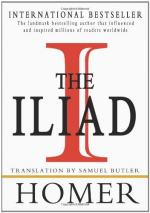|
This section contains 3,900 words (approx. 13 pages at 300 words per page) |

|
SOURCE: Knox, Ronald, and Joseph Russo. “Agamemnon's Test: Iliad 2.73-75.” Classical Antiquity 8, no. 2 (October 1989): 351-58.
In the following essay, Knox and Russo argue for the cogency of Agamemnon's deception of his own troops in Book 2 of the Iliad, despite its unintended failure.
πϱω̑τα δ' ἐγoν ἔπεσιν πειϱήσομαι, ἣ θὔἐμιs ἐστί, aαὶ φεύγειν σὺν νηυσὶ πολυaλήϊσι aελεύσω. ὑμει̑s δ' ἄλλοθεν ἄλλοs ἐϱητύειν ἐπἐεσσιν.
(Iliad, 2.73-75)
In his recent commentary G. S. Kirk writes a long note to try to make sense of Agamemnon's announcement, quoted above, that he will “first test [the troops] with words” before initiating the battle in which he expects to capture Troy that day (ἤματι aείνo, 37).1 Agamemnon has received a dream from Zeus the night before (Διὸs δἐ τοι ἄγγελόs εἰμι, 26 = 63) telling him to arm the men and begin the attack, for now finally all Olympus is united on his side (11-13 = 28-30 = 65-67). In the morning he holds a closed meeting of his general staff, to whom he...
|
This section contains 3,900 words (approx. 13 pages at 300 words per page) |

|


